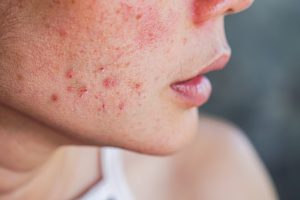 Acne doesn’t necessarily stop after your teenage years; it can affect you far into your adult life. This is what is referred to as hormonal acne (also known as adult acne), which typically occurs in adults between the ages of 20 and 50. It is the most common skin condition in the United States, affecting nearly 80% of Americans at some point during their lifetime. It is most common in women, particularly those who are pregnant or experiencing menopause, but it can affect men, as well.
Acne doesn’t necessarily stop after your teenage years; it can affect you far into your adult life. This is what is referred to as hormonal acne (also known as adult acne), which typically occurs in adults between the ages of 20 and 50. It is the most common skin condition in the United States, affecting nearly 80% of Americans at some point during their lifetime. It is most common in women, particularly those who are pregnant or experiencing menopause, but it can affect men, as well.
Hormonal acne occurs due to an excessive amount of sebum, an oily substance that moisturizes and protects your skin. This can cause your pores to become clogged, causing the sebum to interact with bacteria on the skin, which in turn causes acne to form. Your skin’s production of sebum is affected by hormonal changes in your body. Some factors that can affect these hormonal changes include:
- Stress
- Sleep
- Certain hair and skin products
- Periods
- Pregnancy
- Menopause
- Testosterone treatment
- Certain medications, such as some steroids
- Certain pre-existing medical conditions
- A family history of acne
Not all cases of acne necessarily look the same. It can cause several different types of growths to appear, including:
- Pimples
- Whiteheads (small white or yellowish bumps)
- Blackheads (tiny black bumps or spots)
- Papules (small, cone-shaped bumps)
- Pustules (small bumps that contain pus)
- Cysts (pockets of tissue filled with pus or other fluids)
In some cases, acne may resolve on its own; however, a variety of treatment options are available to reduce its severity, such as steroid injections and topical creams, ointments, and antibiotics. Daily skin cleansing, birth control medication, dietary adjustments, and light therapy can also help.
A dermatologist can help you determine the cause of your acne and find the appropriate course of treatment. To schedule an appointment with one at Flushing Hospital Medical Center’s Ambulatory Care Center, please call (718) 670-5486.
All content of this newsletter is intended for general information purposes only and is not intended or implied to be a substitute for professional medical advice, diagnosis or treatment. Please consult a medical professional before adopting any of the suggestions on this page. You must never disregard professional medical advice or delay seeking medical treatment based upon any content of this newsletter. PROMPTLY CONSULT YOUR PHYSICIAN OR CALL 911 IF YOU BELIEVE YOU HAVE A MEDICAL EMERGENCY.
